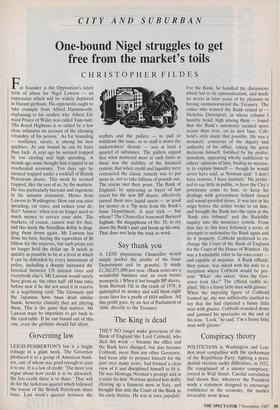The King is dead
THEY NO longer make governors of the Bank of England like Lord Cobbold, who died this week — because the office and the Bank have changed, but also because Cobbold, more than any other Governor, had been able to prepare himself for the part over many years, had formed a clear view of it and disciplined himself to fit it. He was Montagu Norman's protégé and in a sense his heir. Norman spotted him deftly clearing up a financial mess in Italy, and brought him into the Court of the Bank in his early thirties. He was at once papaNle. For the Bank, he handled the discussions which led to its nationalisation, and made no secret in later years of his pleasure in having outmanoeuvred the Treasury. The critics who wanted the Bank reined in Nicholas Davenport, in whose column I humbly tread, high among them — found that the Bank's autonomy seemed more secure than ever, on its new base. Cob- bold's style made that possible. He was a monarch, conscious of the dignity 'and authority of his office, taking the great decisions himself, fortified by his profes- sionalism, appearing wholly indifferent to others' opinions of him, finding no necessi- ty to explain himself — though he would never have said, as Norman said: `I don't have reasons, I have instincts.' He prefer- red to say little in public, to have the City's potentates come to him, to keep his dealings with government behind closed and sound-proofed doors. It was late in his reign before the critics broke in on him, and brought the Bank into the open at the `Bank rate tribunal' and the Radcliffe inquiry into the monetary system. From that day to this have followed a series of attempts to nationalise the Bank again and do it properly. Cobbold preferred to ex- change the Court of the Bank of England for the Court of the House of Windsor. He was a formidable ruler in his own court and capable of surprises. A Bank official, then junior, was asked with his wife to a reception where Cobbold would be pre- sent. 'What', she asked, `does the Gov- ernor look like?' The official rashly re- plied, `He's a funny little man with glasses.' When the imposing figure of Cobbold loomed up, she was sufficiently startled to say that she had expected a funny little man with glasses. Cobbold crouched down and jammed his spectacles on the end of his nose. 'Look,' he said, `I'm a funny little man with glasses.'


































































 Previous page
Previous page